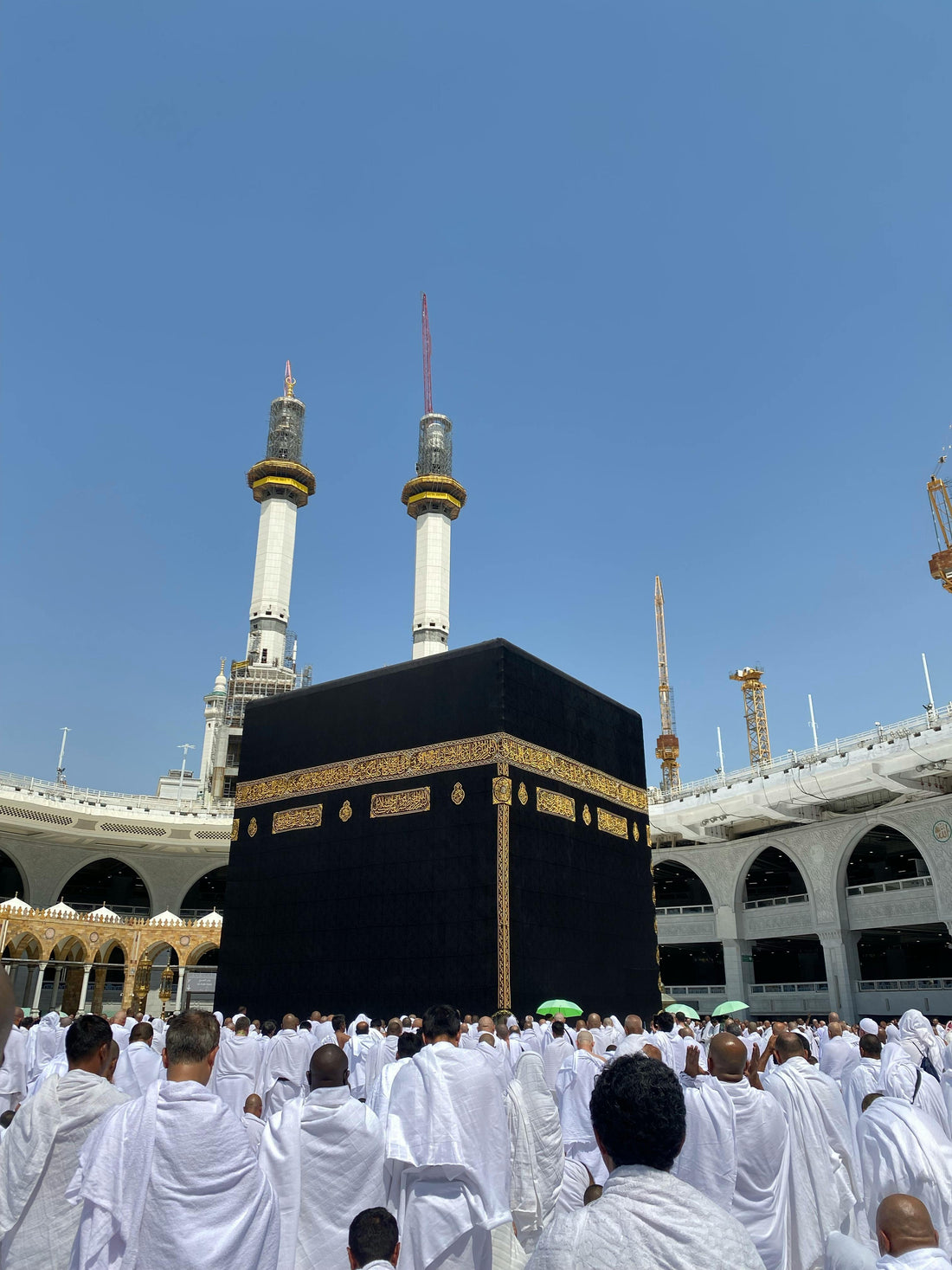Hajj is one of the most significant rituals in our Islamic faith and it is an obligatory journey on every Muslim to perform it.
It is not merely a ‘trip’, but a profound spiritual cleansing retreat to revive our faith in Allah (SWT) and renew our sense of purpose in our life and unite as a community in worshipping The One.
Each act within this pilgrimage serves multiple spiritual purposes offering us opportunities for reflection whether we are in the Holy land or anywhere around the world. We would like to share some of these reflections with you, and pray that you and your family will benefit from them:
Talbiya:

Reviving our purpose and allegiance to Allah (SWT) through repeated recitation of “Labbayka Allahumma Labbayk, labbayka laa shareeka laka labbayk. Inna al-hamd wa’l-ni’mata laka wa’l-mulk, laa shareeka lak.”
This powerful invocation prompts us to review our life and our purpose, remembering that whilst our life goals may be many, our purpose should be one; to serve and seek the pleasure of Allah (SWT). We declare through these beautiful words that we turn in submission to Allah (SWT) and all that we have and all that we do is for Him alone.
Ihram:

The white clothing symbolising purity and unity of humanity. It reminds us that regardless of our backgrounds or social and economic statuses, we enter Hajj in simple white garments, free of decoration or perfume. This simplicity prevents us from being distracted by material adornments, allowing the only visible adornments of importance to be that of our faith.
Tawaf:
The act of circling around the Kaaba seven times serves as a powerful reminder that our lives should revolve around Allah (SWT) and nothing else. How can we incorporate this principle into our everyday lives?
Though intention. By setting the intention that every action — whether heading to work, feeding our children, fasting or praying— is for Allah (SWT), we ensure that everything we do is in His name. This helps us ensure that our lives revolve around Him.
We learn this from Prophet Ibrahim (AS) who said:
The Holy Qur'an (6:79)
By being mindful of this intention, Allah (SWT) will insha’Allah, guide us to remain obedient to Him in all that we do.
Sa’ee:

This ritual reenacts the story of Hajar running between the mounts of Safa and Marwa in search for water for her thirsty baby.
The significance of this story imparts many life lessons. It teaches us the importance of striving diligently in life to seek blessings from Allah (SWT). We learn to trust Allah (SWT) and entrust our families and everything we hold dear to Him, recognising that He is the ultimate Provider and Sustainer.
Arafah:

Jamaraat in Mina:

Life is filled with temptations and adornments that attach us to this temporary life. The shaytan (both of the jinn and people) and our own selves (nafs) can tempt us to engage in actions that displease Allah (SWT). The ritual of striking the Jamaraat with stones symbolises the rejection of these desires and temptations. This practice teaches us to confront and overcome our own weaknesses.
Let’s create a space where we can journal our unique temptations, identify what we need to say ‘no’ to and what we need to say ‘yes’ to, so we deepen our connection to the beauty and love of Allah (SWT).
Qurbani:

The practice of sacrifice reminds us of the profound challenge faced by Prophet Ibrahim (AS) when he was asked to sacrifice his own son for Allah (SWT). Their story teaches us that everything we have and love is given to us by Allah (SWT) and ultimately belongs to Him. From both Prophets Ibrahim (AS) and Ismael (AS), we learn the beauty of ultimate submission and patience.
Allah’s (SWT) challenge shows us their true faith and it is this deep faith that enabled them to face this immense test successfully. Let us make the intention that while we donate money to charity or perform Qurbani, we remain mindful that every blessing we have is from Allah (SWT) and that we submit all these blessings to serve in His path.
Whilst, we may not be able to physically partake in the Hajj ritual this year, let us all do our best to spiritually take part from wherever we are in the world. As the opportunity is here, let us reflect, repent and review our actions and work on ourselves in order to meet our full potential in this world and in the Akhirah insha'Allah.

